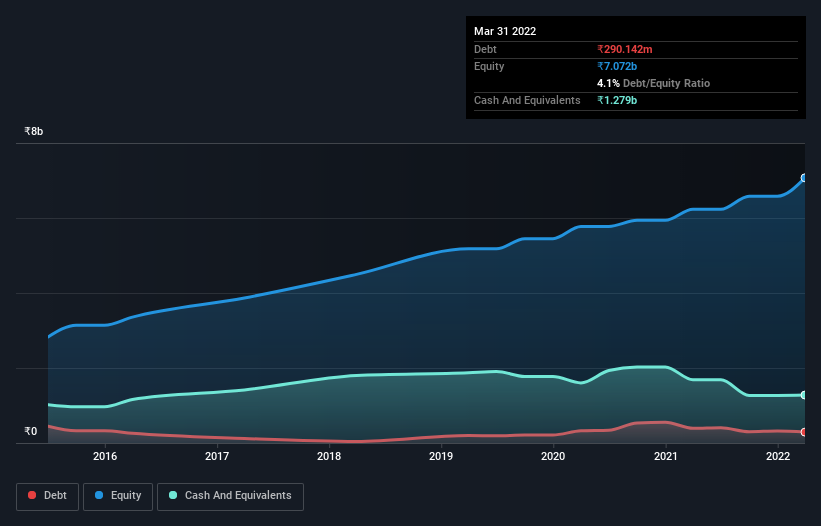These 4 Measures Indicate That Mayur Uniquoters (NSE:MAYURUNIQ) Is Using Debt Reasonably Well

Legendary fund manager Li Lu (who Charlie Munger backed) once said, 'The biggest investment risk is not the volatility of prices, but whether you will suffer a permanent loss of capital.' It's only natural to consider a company's balance sheet when you examine how risky it is, since debt is often involved when a business collapses. We can see that Mayur Uniquoters Limited (NSE:MAYURUNIQ) does use debt in its business. But is this debt a concern to shareholders?
When Is Debt Dangerous?
Debt assists a business until the business has trouble paying it off, either with new capital or with free cash flow. In the worst case scenario, a company can go bankrupt if it cannot pay its creditors. While that is not too common, we often do see indebted companies permanently diluting shareholders because lenders force them to raise capital at a distressed price. Of course, plenty of companies use debt to fund growth, without any negative consequences. The first step when considering a company's debt levels is to consider its cash and debt together.
Check out our latest analysis for Mayur Uniquoters
What Is Mayur Uniquoters's Net Debt?
You can click the graphic below for the historical numbers, but it shows that Mayur Uniquoters had ₹290.1m of debt in March 2022, down from ₹392.3m, one year before. But it also has ₹1.28b in cash to offset that, meaning it has ₹988.7m net cash.

A Look At Mayur Uniquoters' Liabilities
Zooming in on the latest balance sheet data, we can see that Mayur Uniquoters had liabilities of ₹922.0m due within 12 months and liabilities of ₹225.8m due beyond that. Offsetting these obligations, it had cash of ₹1.28b as well as receivables valued at ₹1.25b due within 12 months. So it can boast ₹1.38b more liquid assets than total liabilities.
This surplus suggests that Mayur Uniquoters has a conservative balance sheet, and could probably eliminate its debt without much difficulty. Succinctly put, Mayur Uniquoters boasts net cash, so it's fair to say it does not have a heavy debt load!
Mayur Uniquoters's EBIT was pretty flat over the last year, but that shouldn't be an issue given the it doesn't have a lot of debt. When analysing debt levels, the balance sheet is the obvious place to start. But ultimately the future profitability of the business will decide if Mayur Uniquoters can strengthen its balance sheet over time. So if you're focused on the future you can check out this free report showing analyst profit forecasts.
Finally, a business needs free cash flow to pay off debt; accounting profits just don't cut it. Mayur Uniquoters may have net cash on the balance sheet, but it is still interesting to look at how well the business converts its earnings before interest and tax (EBIT) to free cash flow, because that will influence both its need for, and its capacity to manage debt. In the last three years, Mayur Uniquoters created free cash flow amounting to 2.1% of its EBIT, an uninspiring performance. For us, cash conversion that low sparks a little paranoia about is ability to extinguish debt.
Summing up
While it is always sensible to investigate a company's debt, in this case Mayur Uniquoters has ₹988.7m in net cash and a decent-looking balance sheet. So we are not troubled with Mayur Uniquoters's debt use. When analysing debt levels, the balance sheet is the obvious place to start. But ultimately, every company can contain risks that exist outside of the balance sheet. For example Mayur Uniquoters has 2 warning signs (and 1 which can't be ignored) we think you should know about.
At the end of the day, it's often better to focus on companies that are free from net debt. You can access our special list of such companies (all with a track record of profit growth). It's free.
If you're looking to trade Mayur Uniquoters, open an account with the lowest-cost platform trusted by professionals, Interactive Brokers.
With clients in over 200 countries and territories, and access to 160 markets, IBKR lets you trade stocks, options, futures, forex, bonds and funds from a single integrated account.
Enjoy no hidden fees, no account minimums, and FX conversion rates as low as 0.03%, far better than what most brokers offer.
Sponsored ContentNew: Manage All Your Stock Portfolios in One Place
We've created the ultimate portfolio companion for stock investors, and it's free.
• Connect an unlimited number of Portfolios and see your total in one currency
• Be alerted to new Warning Signs or Risks via email or mobile
• Track the Fair Value of your stocks
Have feedback on this article? Concerned about the content? Get in touch with us directly. Alternatively, email editorial-team (at) simplywallst.com.
This article by Simply Wall St is general in nature. We provide commentary based on historical data and analyst forecasts only using an unbiased methodology and our articles are not intended to be financial advice. It does not constitute a recommendation to buy or sell any stock, and does not take account of your objectives, or your financial situation. We aim to bring you long-term focused analysis driven by fundamental data. Note that our analysis may not factor in the latest price-sensitive company announcements or qualitative material. Simply Wall St has no position in any stocks mentioned.
About NSEI:MAYURUNIQ
Mayur Uniquoters
Engages in the manufacture and sale of coated textile fabrics in India and internationally.
Flawless balance sheet with solid track record and pays a dividend.


